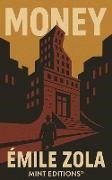Read more
Financially ruined by a previously failed enterprise, Aristide Saccard, a ruthless and ambitious speculator, endeavors to recover his fortune by establishing the fictitious Banque Universelle. Through Saccard's reliance on intrigue and market manipulation, Émile Zola explores the devastating effects of speculation on all social strata, from the rich to the poor, and offers a satirical indictment of the corruption and negligence of contemporary financial systems.Published in 1891,
Money is a work of French Naturalism by Émile Zola and the eighteenth novel in his twenty-volume Rougon-Macquart series. While infused with his 1890's perspective, Zola's meticulously researched narrative delves into the world of the Second French Empire's financial market (1852-1870), detailing Saccard's use of intrigue and financial manipulation to inflate his company's value. The novel still serves as a powerful and all-too-topical exploration of the dynamics of greed and its relationship with politics and the press.
Since our inception in 2020,
Mint Editions has kept sustainability and innovation at the forefront of our mission. Each and every Mint Edition title gets a fresh, professionally typeset manuscript and a dazzling new cover, all while maintaining the integrity of the original book.
With thousands of titles in our collection, we aim to spotlight diverse public domain works to help them find modern audiences. Mint Editions celebrates a breadth of literary works, curated from both canonical and overlooked classics from writers around the globe.
About the author
Émile Zola (1840-1902) was a French novelist, journalist, and playwright. Born in Paris to a French mother and Italian father, Zola was raised in Aix-en-Provence. At 18, Zola moved back to Paris, where he befriended Paul Cézanne and began his writing career. During this early period, Zola worked as a publishing clerk while critiquing literature and art and covering political topics for local newspapers. Following the success of his novel
Thérèse Raquin (1867), Zola began a series of twenty novels known as Les Rougon-Macquart, a sprawling collection following the fates of a single family living under the Second French Empire of Napoleon III. Zola’s work earned him a reputation as a leading figure in literary naturalism, a style noted for its rejection of Romanticism in favor of detachment, rationalism, and social commentary. Following the infamous Dreyfus affair of 1894, in which a French-Jewish artillery officer was falsely convicted of spying for the German Embassy, Zola wrote a scathing open letter to French President Félix Faure accusing the government and military of antisemitism and obstruction of justice. Having sacrificed his reputation as a writer and intellectual, Zola's outspoken courage helped reverse public opinion on the affair, placing pressure on the government that led to Dreyfus’ full exoneration in 1906. Nominated for the Nobel Prize in Literature in 1901 and 1902, Zola is considered one of the most influential and talented writers in French history.

